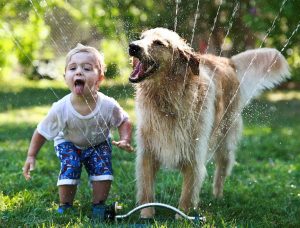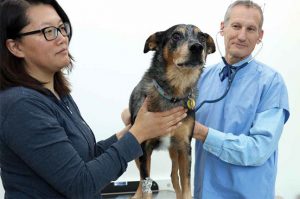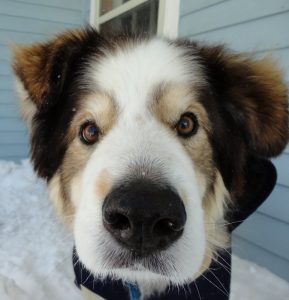
“When the Man waked up he said, ‘What is Wild Dog doing here?’ And the Woman said, ‘His name is not Wild Dog any more, but the First Friend, because he will be our friend for always and always and always.’” ― Rudyard Kipling (The Jungle Book)
In This Issue: World Cancer Day; A Shot at Preventing Canine Cancer; Increased Clinical Trials to Benefit Veterinary Vaccines Landscape; Be Our Valentine ― Shop Amazon Smile; Pup of the Month.
February 4th is World Cancer Day

The unbridled joy of a dog and his child should never be interrupted by cancer.
Today, February 4, is World Cancer Day. What does “World Cancer Day” mean? It’s supposed to “raise awareness of cancer and to encourage its prevention, detection, and treatment.”
But all of us are more than a little aware of cancer. We live with cancer every day, in some form or another. Our animals have it or our kids or our parents or our friends or our colleagues. Or we have it. That covers just about everyone we know. We’re all painfully acquainted with the merciless impact cancer has on those we love and care for.
And by now we all know the statistics about dogs and cancer: cancer is the leading cause of death in dogs over the age of 10; there are nearly 100 types of animal cancers; dogs get cancer at about the same rate as humans; many cancers are the same in dogs as in people; some dog breeds are more prone to developing cancer much earlier than others; even puppies and young dogs get cancer.
These facts are shocking. And the reality is heartbreaking.
That’s why, because cancer does touch everyone, The Puppy Up Foundation needs to continue to fund the remarkable work in comparative oncology research that is yielding so many more options, and so many new possibilities ― not only for treatments and cures but for prevention. Think of it. Prevention is something researchers dared only imagine just a few years ago.
Someone you love needs this research to continue.
To donate, please follow this link.
We thank you for your sustained support for the work we do.
Are you familiar with our Memorial Wall? If you have a loved one (canine, human, feline, or other) who has known cancer, we hope you’ll make an honorary or memorial donation in their name, and include a photo and story with your donation. Their stories are important and need to be shared.
Stories of love, courage, and determination are inspiring and contagious. They nurture hope.
A Shot At Preventing Canine Cancer

UW Veterinary Care oncologist David Vail examines Senna, an 8-year-old Catahoula Leopard Dog held by owner Caitlin Junj. In September, Senna received his final chemotherapy treatment for multicentric lymphoma, a common cancer in dogs. A five-year clinical trial launched this fall will test a novel vaccine for the prevention of many types of cancer – a potential paradigm shift in veterinary and human medicine.
Five-year trial now underway to test universal vaccine
From The University of Wisconsin, Madison
Could the body’s own immune system be primed to prevent cancer through a quick vaccine? A clinical trial launched this fall aims to bring new clarity to this complex question.
“We’re testing a totally novel way of creating an anticancer immune response,” says David Vail, a board-certified oncologist with UW Veterinary Care.
The Vaccination Against Canine Cancer Study will evaluate a vaccine strategy for the prevention, rather than the treatment, of cancer in dogs. With more than 800 patients enrolled as participants, it is the largest clinical trial conducted to date for canine cancer and across the history of veterinary medicine. The UW School of Veterinary Medicine is one of three participating institutions, together with Colorado State University and the University of California, Davis.
Cancer is the number one cause of illness and death in the aging dog population, with approximately one out of every three dogs affected and six million new cancer diagnoses made in dogs each year. If the trial is successful, it could not only provide a new strategy to prevent a critical health concern in canine companions, but it could also provide justification for studying a similar approach in people.
“The holy grail would be to prevent cancer as opposed to waiting for it to start and then treating it,” says Vail.
Much like an influenza vaccine bolsters the body’s readiness to fight the flu, this preventative cancer vaccine follows the same principle — “to have the immune system primed such that if a cancer cell develops, it will attack,” Vail says.
Traditionally, vaccines work by introducing into the body a protein found on the surface of the virus that the vaccine is protecting against. The immune system sees the protein as a threat, establishes a memory of it, and then, if there is a later infection, recognizes that protein and is primed to react.
“It’s almost like putting up a wanted poster for that particular virus,” Vail explains. “When that virus infects you, then the immune cells recognize it because of the ‘poster,’ go out, and kill it.”
For the rest of the article, please follow this link.
Increase Clinical Trials to Benefit Veterinary Vaccines Landscape
Veterinary vaccines are important tools for veterinarians in managing the well-being and health of animals. Furthermore, the increasing understanding of pathogenicity, epidemiology, and immunology have provided new opportunities for the veterinarians. This has increasingly provided various profit gaining opportunities to the manufacturers of veterinary vaccines.
Burgeoning Clinical Trials to Foster Vaccine Development
The accelerating research and development activities in veterinary care are expected to foster the development of veterinary vaccines. The increasing clinical trials and the constant efforts of veterinarians across the globe towards the wellbeing of animals has given rise to various progressive changes. For instance, the oncology department at the University of Wisconsin-Madison Veterinary Care is conducting a clinical trial which could develop a canine cancer vaccine. On account of which, in the next couple of weeks, the department would inject either a vaccine or a placebo to 300 local dogs, which is meant to cease canine cancer, before it outsets.
For the rest of the article, please follow this link.
Amazon Smile For Valentine’s Day

Shop Amazon Smile And Help The Puppy Up Foundation Too!
That’s one dapper puppy. And he has the right idea. If you’re shopping for your Valentine (February 14th is closer than you think), you know you’ll find your love’s desire on Amazon. So why not help The Puppy Up Foundation too? Show us some love this Valentine’s Day and make the Puppy Up Foundation your charity of choice. (We hope you’ll always make us your charity of choice.)
How does that help us? Amazon donates 0.5% of the price of your eligible AmazonSmile purchases to The Puppy Up Foundation..
Happy Valentine’s Day from your friends at The Puppy Up Foundation!
Pup of the Month — Woody Vivero

Woody Vivero
(Erin Vivero) Woody was approximately 8 years old when he got his forever home. He traveled from Montana to Connecticut to enjoy a life he never knew existed. Considering the fact that he never knew what being unchained felt like, and lived on a diet of dirt and rocks, there were definitely some challenges ahead…but he thrived. He became the poster dog for forgiveness. He loved everyone, especially his pet rock.
Anyone that met Woody knew that he was a character. He even looked like a cartoon (many thought)! He loved to show off ALL of his toys (he had about 40) to anyone that came to visit. Then mom had to pick them all up and put them back in the basket. He insisted on marking all the trees uphill. This usually resulted in him missing completely and falling downhill, but that didn’t stop him from trying. If you asked him what kind of music he liked he would tell you that Barry Manilow really soothed him.
The cancer went undetected for quite some time. It never occurred to any of us that after all the neglect and abuse he suffered that cancer would be the one thing he couldn’t fight off. Doc wasn’t sure how much time he had, but Woody was a fighter and we got one more year! We tried many things to combat the diagnosis but we also wanted to keep his quality of life in mind. Then one day it was decided for him. It was very quick and we were all thankful that he truly didn’t suffer in spite of our anger and sadness that cancer took him from the life he had waited so long for and deserved so much.
(Woody was a contestant in the 2017 Puppy Up Calendar Contest.
We can always use your help. If you’re interested, send me an mail at ginger@puppyup.org.
Sincerely,
Ginger Morgan, Executive Director
The Puppy Up Foundation








